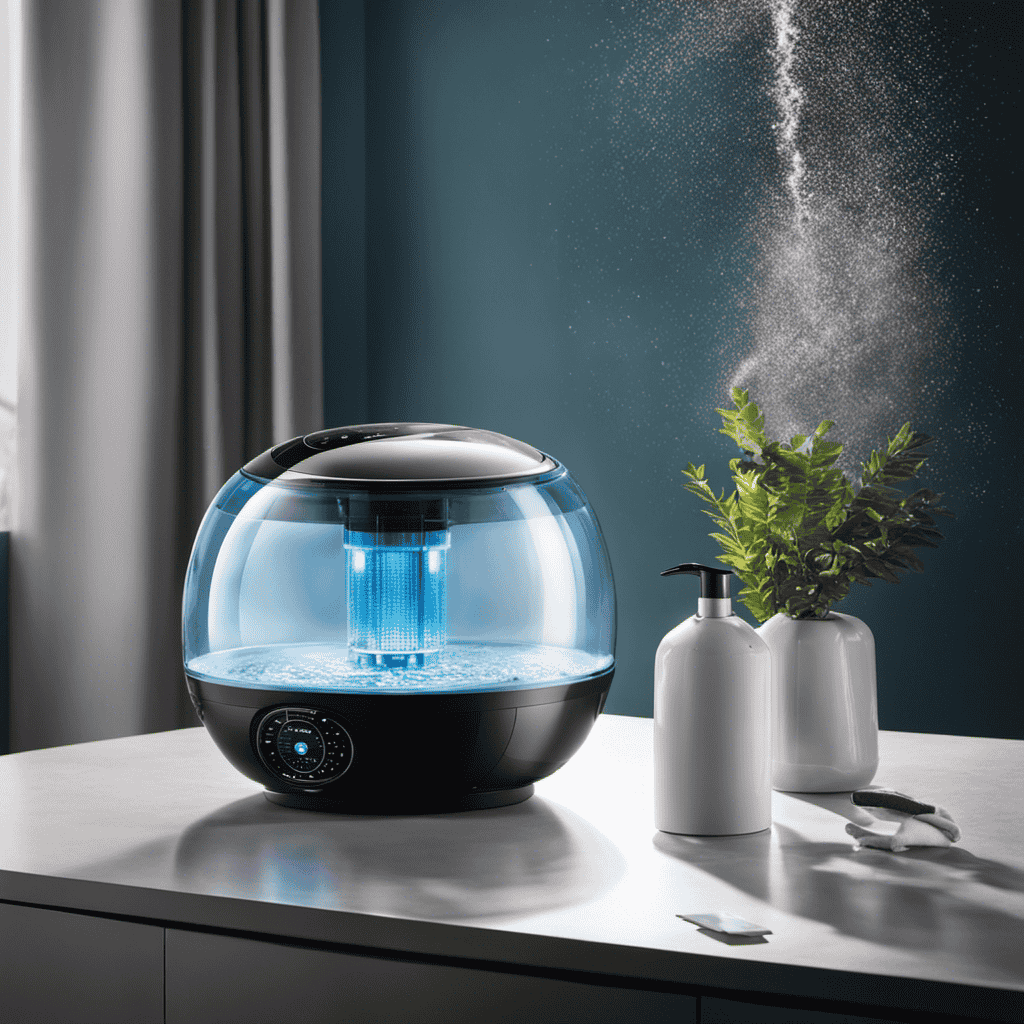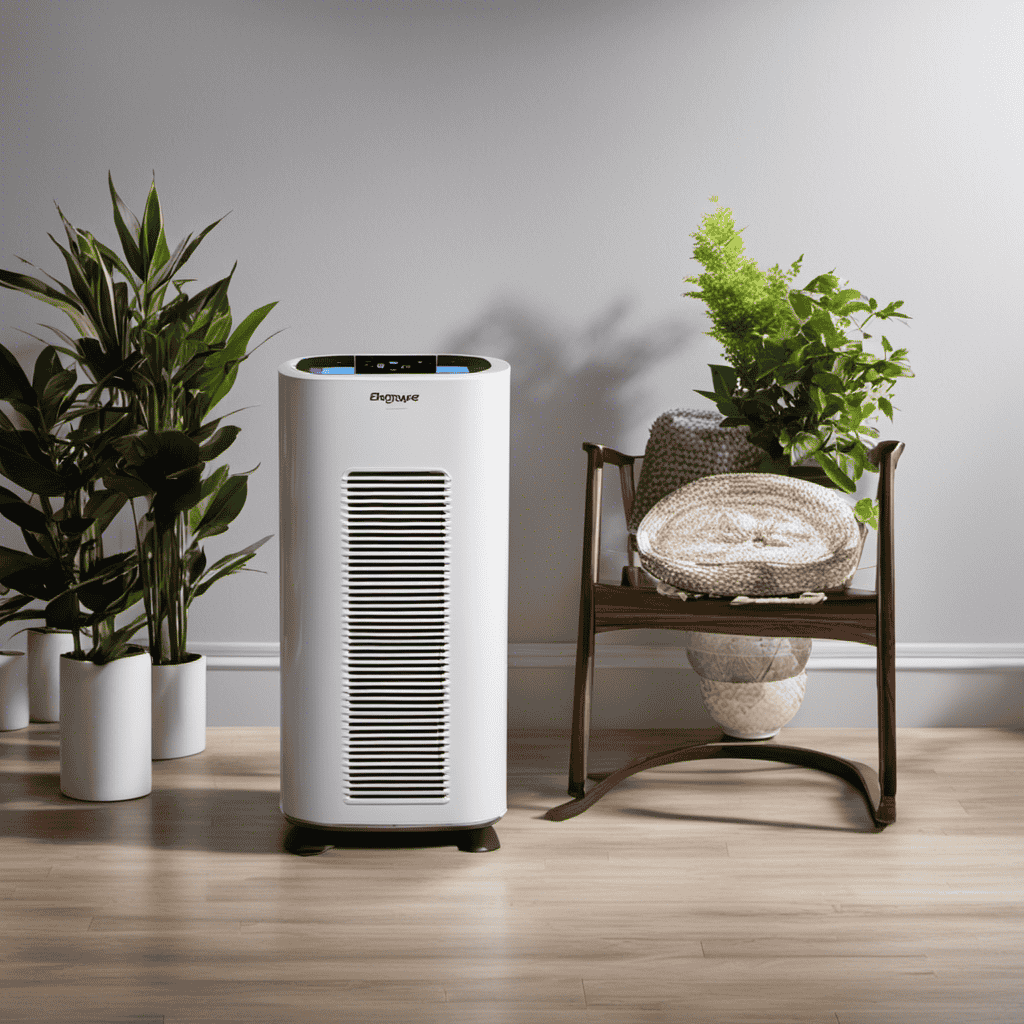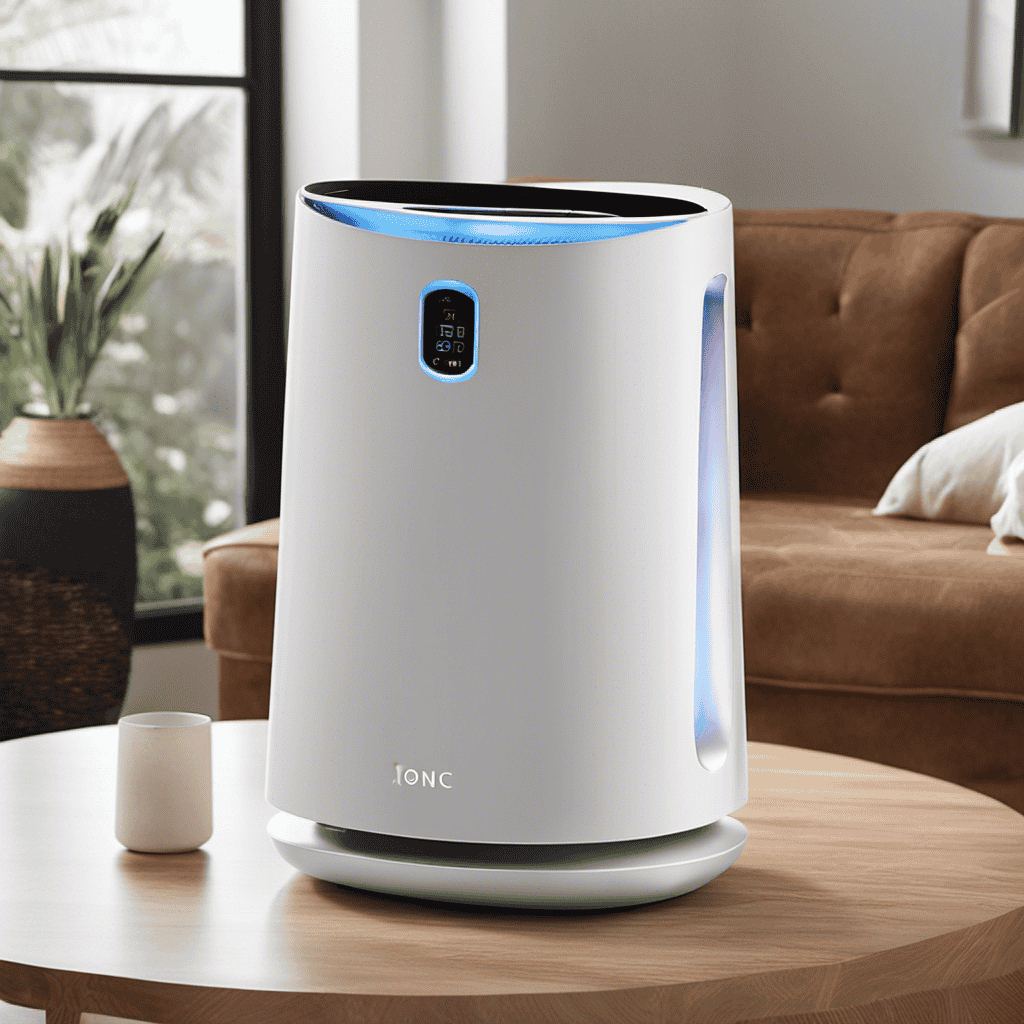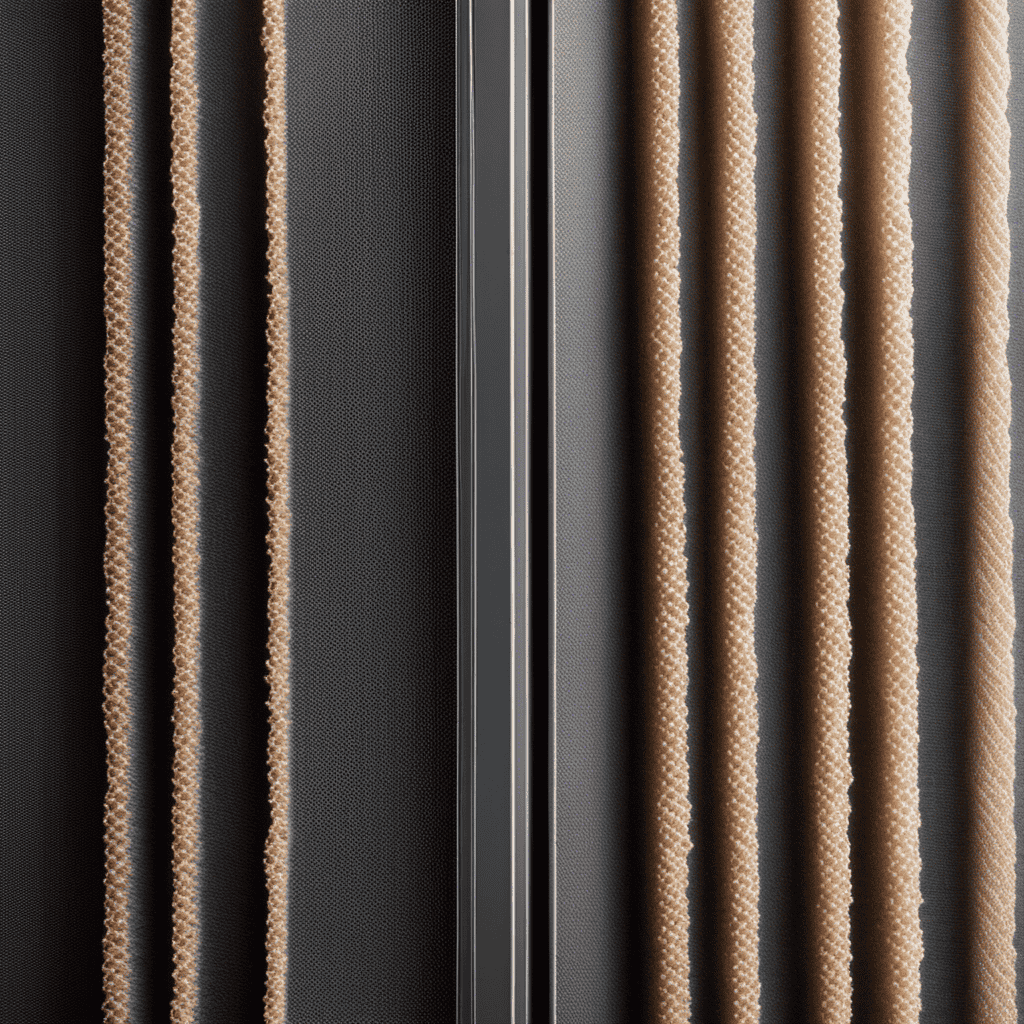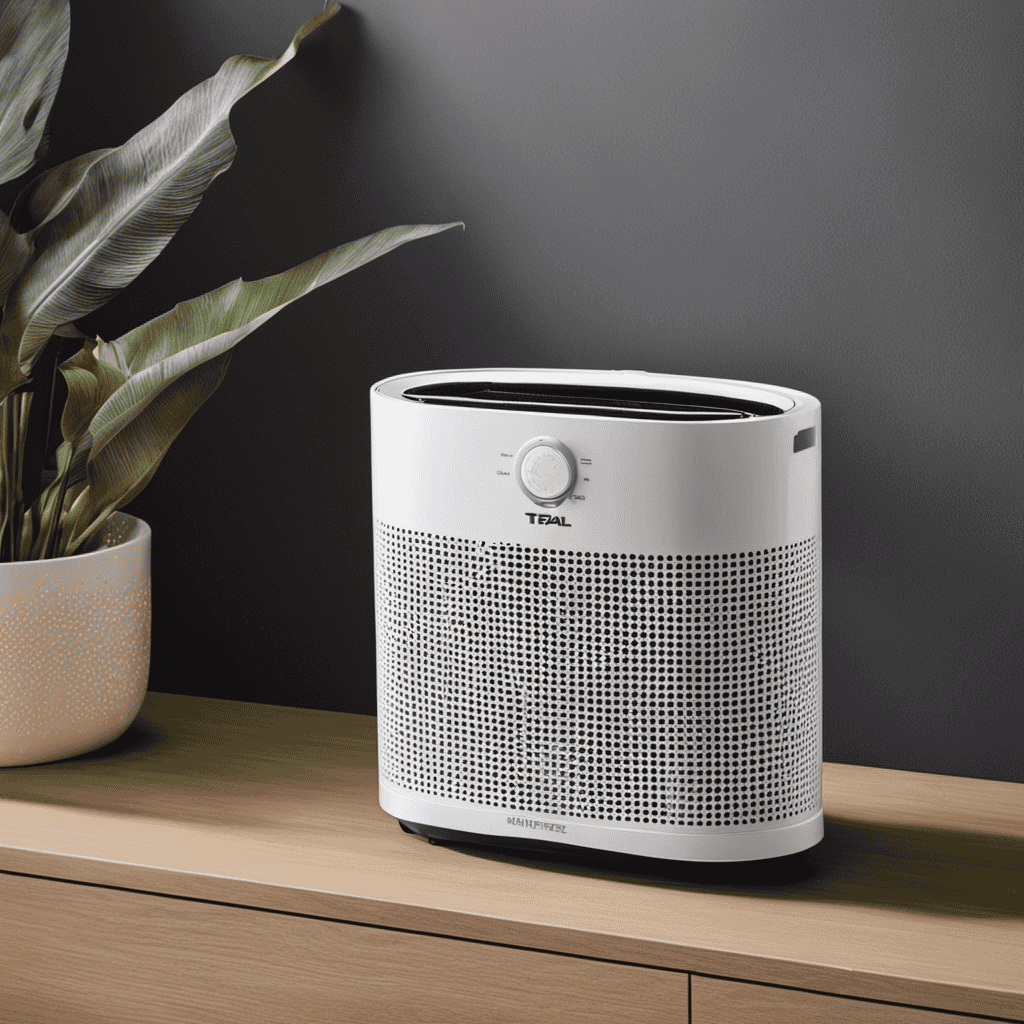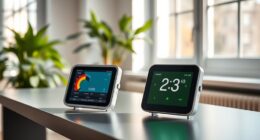Did you know that several factors can influence the average lifespan of an air purifier filter? It is crucial to understand when to change your air purifier filter in order to maintain clean and healthy indoor air.
In this article, I will provide you with expert advice on how often you should replace your air purifier filters based on their type and usage. Additionally, I will share tips on extending their lifespan and common mistakes to avoid.
Let’s dive in and ensure that your air purifier is working at its best!
Key Takeaways
- Air purifier filters should be replaced every 6 to 12 months, but this can vary based on factors such as air quality, usage frequency, and the presence of pets.
- Regular monitoring and maintenance of air purifier filters is necessary to ensure optimal performance and efficiency.
- Proper maintenance techniques include regular cleaning of washable filters and using a soft brush or vacuum for non-washable filters.
- Signs of filter replacement include decreased airflow, accumulated dirt and debris on the filter, reduced airflow, and a musty odor. Regular filter maintenance is important for optimal performance.
Factors Affecting Filter Lifespan
Factors like air quality, usage frequency, and the presence of pets can affect how often you need to change air purifier filters. To ensure optimal filter performance and efficiency, it is important to understand how these factors impact the lifespan of the filters.
Air quality plays a crucial role in filter maintenance. If you live in an area with high pollution levels or have frequent exposure to smoke or allergens, your filters may get clogged faster and require more frequent replacement.
The usage frequency also affects filter efficiency. If your air purifier is running constantly, the filters will accumulate more contaminants and need to be changed more often.
Additionally, the presence of pets can significantly decrease the lifespan of your filters due to pet dander and hair.
Regularly monitoring and addressing these factors will help you determine the appropriate intervals for changing your air purifier filters.
Recommended Filter Change Frequency
When it comes to optimal filter replacement and cost-effective filter maintenance, there are a few key points to consider.
First, it is important to understand the recommended filter change frequency for your specific air purifier. This can vary depending on factors such as the type of filter used, the air quality in your environment, and the manufacturer’s recommendations.
Optimal Filter Replacement
To make sure your air purifier is working effectively, it’s important to know the optimal time to replace the filter. Factors affecting efficiency and long-term filter performance should be considered to maximize the air purifier’s effectiveness. When it comes to filter replacement, several factors come into play, including the quality of the air in your environment, the size of the room, and the type of filter being used. It’s crucial to monitor the air quality and check the filter regularly to ensure optimal performance. Below is a table that outlines the general guidelines for filter replacement based on these factors:
| Factors affecting efficiency | Long-term filter performance | Recommended filter change frequency |
|---|---|---|
| Poor air quality | Small room | Every 2-3 months |
| Moderate air quality | Medium-sized room | Every 4-6 months |
| Good air quality | Large room | Every 6-12 months |
Cost-Effective Filter Maintenance
Regularly replacing your air purifier’s filter can help you save money in the long run. One of the most cost-effective strategies for maintaining your filter is to clean it regularly. Cleaning your filter not only extends its lifespan but also improves its efficiency.
Start by turning off the purifier and unplugging it from the power source. Gently remove the filter and inspect it for any visible dirt or debris. If the filter is washable, rinse it under running water until it is clean. Allow it to air dry completely before reinserting it back into the purifier.
For non-washable filters, use a soft brush or vacuum cleaner to remove any loose particles. Remember, regular cleaning and proper maintenance are key to ensuring that your air purifier functions optimally and saves you money on filter replacements.
Signs That Indicate a Filter Needs to Be Replaced
As an expert in air purifier maintenance, I can provide valuable insights on the signs that indicate a filter needs to be replaced and the recommended frequency for replacement.
One of the key warning signs of a clogged filter is a noticeable decrease in the air purifier’s performance, such as reduced airflow and a decrease in the overall air quality.
Additionally, a visual inspection of the filter can reveal accumulated dirt and debris, further indicating the need for replacement.
It is generally recommended to replace air purifier filters every 6 to 12 months, depending on factors such as usage, air quality, and the specific type of filter being used.
Clogged Filter Warning Signs
If you notice reduced airflow or a musty odor, it’s a sign that your air purifier filter may be clogged. Regular filter maintenance is essential to ensure optimal performance and clean air in your home. Here are some filter maintenance tips and filter replacement indicators to help you keep your air purifier running smoothly.
| Filter Maintenance Tips | Filter Replacement Indicators |
|---|---|
| Clean or replace filters regularly | Reduced airflow |
| Follow manufacturer’s instructions | Musty odor |
| Check filters for dirt and debris | Decreased efficiency |
| Vacuum or wash reusable filters | Visible dust buildup |
Recommended Replacement Frequency
In order to determine the recommended replacement frequency for air purifier filters, it is important to consider several factors that can affect filter performance.
One of the key factors is the air quality in your environment. If you live in an area with high levels of pollution or allergens, your filters may become clogged more quickly and require more frequent replacement.
Additionally, factors such as the size of your home, the number of occupants, and the presence of pets can also impact filter lifespan.
It is important to regularly monitor the condition of your filters and replace them as needed to ensure optimal performance of your air purifier.
In the next section, we will discuss the different types of air purifier filters and their lifespan.
Different Types of Air Purifier Filters and Their Lifespan
The lifespan of different types of air purifier filters varies. It is important to understand the different factors that can affect the effectiveness of these filters and how to properly maintain them. Here are some key points to consider:
-
Filter Type: There are various types of air purifier filters available, including HEPA filters, activated carbon filters, and electrostatic filters. Each type has a different lifespan based on its design and materials used.
-
Air Quality: The quality of the air in your environment can impact how quickly your filters become clogged. Factors such as high levels of pollutants, pet dander, and smoke can shorten the lifespan of your filters.
-
Filter Maintenance: Regularly cleaning and replacing your air purifier filters is essential for optimal performance. Vacuuming or washing reusable filters, and replacing disposable filters according to the manufacturer’s recommendations, will help maintain filter effectiveness.
-
Environment: The specific conditions in which your air purifier operates can also affect filter lifespan. Factors such as humidity levels, temperature, and airflow can impact the performance and lifespan of your filters.
Extending the Lifespan of Your Air Purifier Filters
Regularly cleaning and maintaining your air purifier filters can help extend their lifespan and improve their performance. To extend the lifespan of your air purifier filters, it is important to follow a few key steps.
First, make sure to vacuum or brush off any visible dirt or debris from the surface of the filters. Next, gently wash the filters with warm water and a mild detergent, being careful not to damage the delicate filter material. Allow the filters to completely dry before reinserting them into the air purifier.
Additionally, it is recommended to replace the filters according to the manufacturer’s guidelines to ensure optimal performance. By regularly cleaning and maintaining your air purifier filters, you can effectively extend their lifespan and improve their efficiency, resulting in cleaner and healthier air in your home.
This brings us to the importance of regular maintenance for air purifier filters.
Importance of Regular Maintenance for Air Purifier Filters
To keep your air purifier running smoothly, make sure to regularly clean and maintain its filters. Proper maintenance of air purifier filters is crucial for their effective functioning and longevity.
Here are some filter cleaning techniques to help you maintain your air purifier:
-
Vacuuming: Use a soft brush attachment to gently vacuum the surface of the filter, removing dust and debris.
-
Rinsing: Some filters, like washable pre-filters, can be rinsed with water to remove dirt. Make sure to let them dry completely before reinserting them.
-
Dusting: Use a microfiber cloth or a soft brush to gently remove dust from the filter. Be careful not to damage the delicate fibers.
-
HEPA Filters: Consider using HEPA filters, which are highly efficient in capturing microscopic particles. They can improve indoor air quality by trapping allergens, pet dander, and even some viruses.
Regularly cleaning and maintaining your air purifier filters not only ensures optimal performance but also helps improve the air quality in your home, promoting a healthier environment for you and your family.
Common Mistakes to Avoid When Changing Air Purifier Filters
When replacing your air purifier filters, remember not to rush and be careful to avoid common mistakes. Taking the time to properly change your filters can greatly impact the lifespan of the filter and the effectiveness of your air purifier. Here are some tips for prolonging filter lifespan and choosing the right air purifier filter:
-
Regularly clean pre-filters: Pre-filters are the first line of defense against larger particles. Cleaning them regularly will prevent clogs and extend the life of your main filter.
-
Consider filter types: Different air purifier filters target specific pollutants. HEPA filters are great for capturing allergens, while activated carbon filters are effective against odors and chemicals.
-
Check filter compatibility: Make sure the filter you choose is compatible with your specific air purifier model. Refer to the manufacturer’s recommendations or consult the product manual.
Frequently Asked Questions
Can I Clean and Reuse Air Purifier Filters Instead of Replacing Them?
Yes, you can clean and reuse air purifier filters to extend their lifespan. Regular cleaning is important for optimal performance. Follow the manufacturer’s cleaning instructions and maintenance tips to ensure proper functioning of the filters.
How Do I Know if My Air Purifier Filter Is Working Effectively?
To know if my air purifier filter is working effectively, I check for common signs such as reduced airflow, a buildup of dust and dirt, and unpleasant odors. It’s crucial to choose the right air purifier for my needs to ensure optimal performance.
Can I Use a Different Type of Filter in My Air Purifier Than What Is Recommended?
Using a different type of filter in your air purifier than what is recommended can negatively affect its performance. Specific air purifier models require specific filters to effectively remove pollutants from the air.
Will Using a Higher Quality Air Purifier Filter Extend Its Lifespan?
Using a higher quality air purifier filter can extend its lifespan, similar to how a stronger foundation can support a taller building. The improved materials and design allow for better filtration and durability.
What Should I Do if My Air Purifier Filter Gets Wet or Damaged?
If my air purifier filter gets wet or damaged, I should immediately stop using it and consult the manufacturer for guidance on repairing air purifier filters. To prevent damage, I should regularly clean and maintain the filter according to the manufacturer’s instructions.
Conclusion
In conclusion, maintaining clean air in our homes is essential for our health and well-being. Regularly changing air purifier filters is crucial to ensure their effectiveness.
Based on research and expert recommendations, it is advised to replace filters every 3 to 6 months, depending on various factors such as the type of filter and the level of air pollution in your surroundings.
Interestingly, studies have shown that indoor air can be 2 to 5 times more polluted than outdoor air, emphasizing the importance of a well-functioning air purifier.
Remember to always follow the manufacturer’s instructions and perform regular maintenance to extend the lifespan of your filters.

